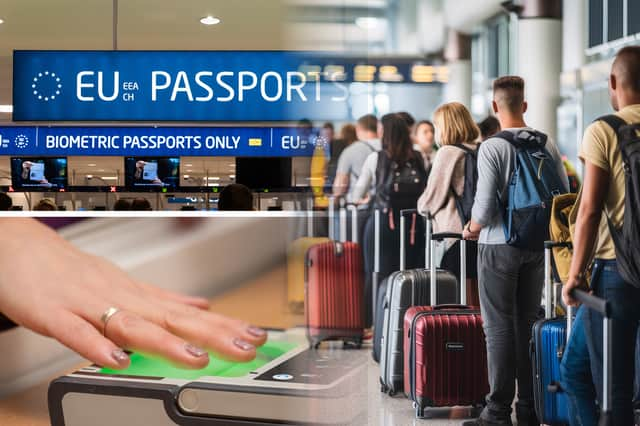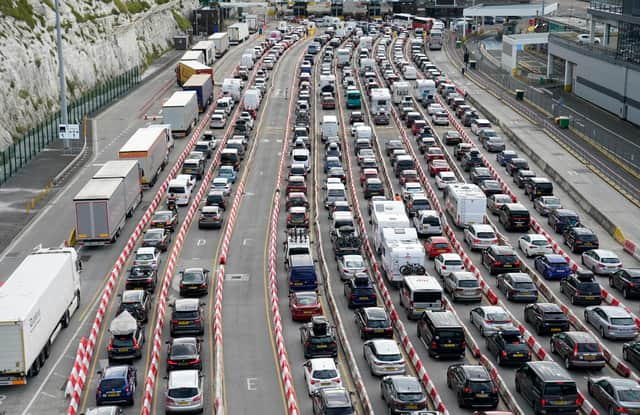Brexit: EU confirms date Britons will have to provide fingerprints to travel to Europe - will there be queues?
and live on Freeview channel 276
British holidaymakers travelling to Europe are set to be hit with huge delays from this Autumn, as they will be required to provide fingerprints and facial scans.
Any visitor from outside the EU will have to give sensitive biometric data at the border as part of the new Entry-Exit System (EES), which will then be stored on a database. This will have to be verified on each subsequent visit. The new system, which has been repeatedly delayed, is a substantial increase in admin for travellers post-Brexit, and comes ahead of the £6 visa-waiver charge in 2025.
Advertisement
Hide AdAdvertisement
Hide AdTravel experts have warned of long delays, particularly at ports and Eurostar terminals where space is restricted. Bosses at the Channel Tunnel estimate processing time for cars will rise from one minute to between five and seven minutes. Passengers flying from the UK will have their biometrics registered on arrival in Europe, which is also likely to cause delays.
What is the Entry-Exit System?
The Entry-Exit System is an automated registration system for UK holidaymakers - who don’t require a visa. It is designed to root out travellers who overstay the current 90-day limit.
It was initially slated to launch in 2022, but has faced multiple setbacks. The EU Council said earlier in the year: “The new roadmap for the delivery of the new IT architecture foresees that the Entry/Exit System will be ready to enter into operation in autumn 2024.” The Independent reported that it will be launched on 6 October next year.
It will replace the much-loved stamps that Britons are currently getting on their passports after Brexit. Travellers will need to have their fingerprints and a facial biometric taken, and scan their passports every time they enter the EU.
Advertisement
Hide AdAdvertisement
Hide Ad

Will there be bigger queues?
It is likely to increase processing times significantly, with one EU government warning: “It takes up to four times longer to do the new process.” Getlink, which operates the Channel Tunnel, is spending £67 million on a new centre, where drivers will have to get out of their cars to enter or verify biometric data. This would be able to process 500 cars per hour, 60% of the tunnel's hourly capacity.
Earlier in the year, French public finance watchdog Cour des Comptes released a report stating that queues at the UK's border with France will double when the EES is brought in. And Doug Bannister, Port of Dover CEO, said it will cause "significant and continued disruption for a very long time".
Eurostar terminals are one of the places where queues will likely be at their most severe. A spokesperson said: "We are working closely with UK and EU member states authorities, as well as with our station owners, to prepare for the implementation of EES. We are actively engaging governments to try and find solutions to preserve a smooth travel experience for our customers."


What is the Electronic Travel Information and Authorisation System (Etias)?
Around six months after the Entry-Exit System is brought in, the EU is expected to roll out the Electronic Travel Information and Authorisation System (Etias). This will be required for non-EU citizens who do not need a visa - such as the UK and other countries like New Zealand - to enter the Schengen Area. This includes almost all EU countries such as France, Spain and Germany, however not Ireland, Cyprus or Romania.
Advertisement
Hide AdAdvertisement
Hide AdIt will require a £6 (7 Euro) fee and last for three years. It was originally due to be implemented from November 2023, but has been delayed repeatedly. The EU Council has now said: “Etias will be ready to enter into operation in spring 2025.”
The Independent’s travel expert Simon Calder reports that there will likely be a soft launch, so the system will only become mandatory in the latter part of 2025.
Guidelines say the system will function in the same way as the American Esta (Electronic System For Travel Authorisation), which means applicants for the Etias will undergo detailed checks to ensure they are eligible to travel to the EU.
You may be denied a permit for several reasons - for example, if you are a convicted criminal, travelling from areas which may pose a danger to public health or on a travel watchlist. The application will include questions about your employment, address and previous trips.
Advertisement
Hide AdAdvertisement
Hide AdRalph Blackburn is NationalWorld’s politics editor based in Westminster, where he gets special access to Parliament, MPs and government briefings. If you liked this article you can follow Ralph on X (Twitter) here and sign up to his free weekly newsletter Politics Uncovered, which brings you the latest analysis and gossip from Westminster every Sunday morning.
Comment Guidelines
National World encourages reader discussion on our stories. User feedback, insights and back-and-forth exchanges add a rich layer of context to reporting. Please review our Community Guidelines before commenting.
